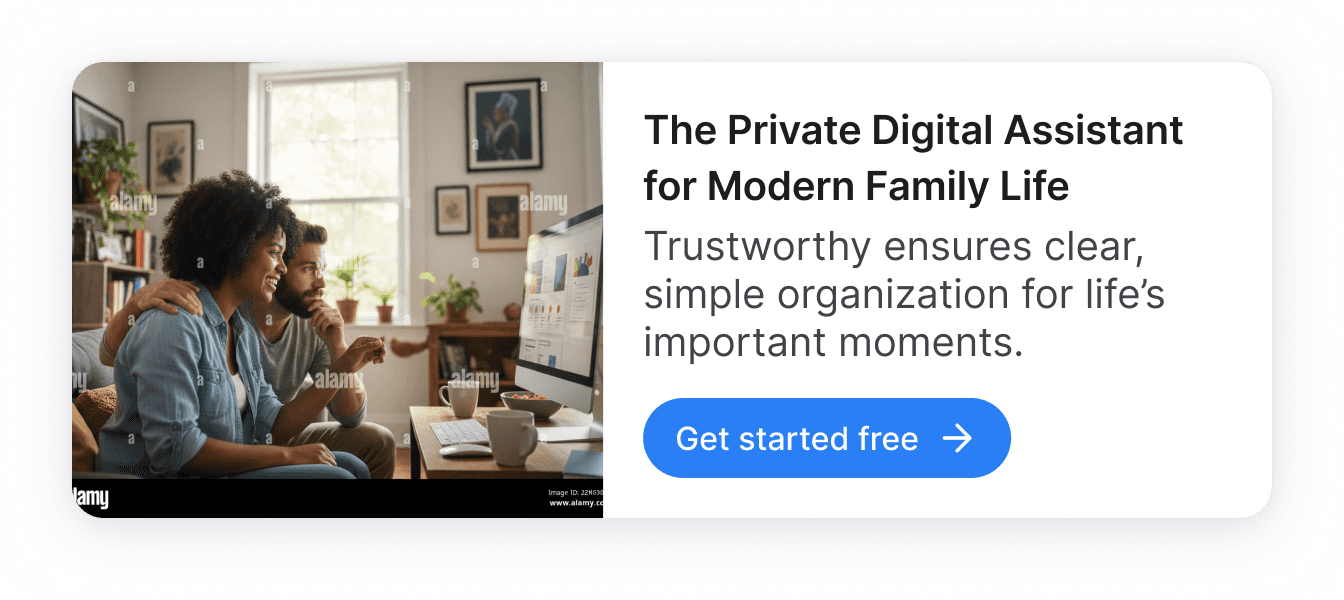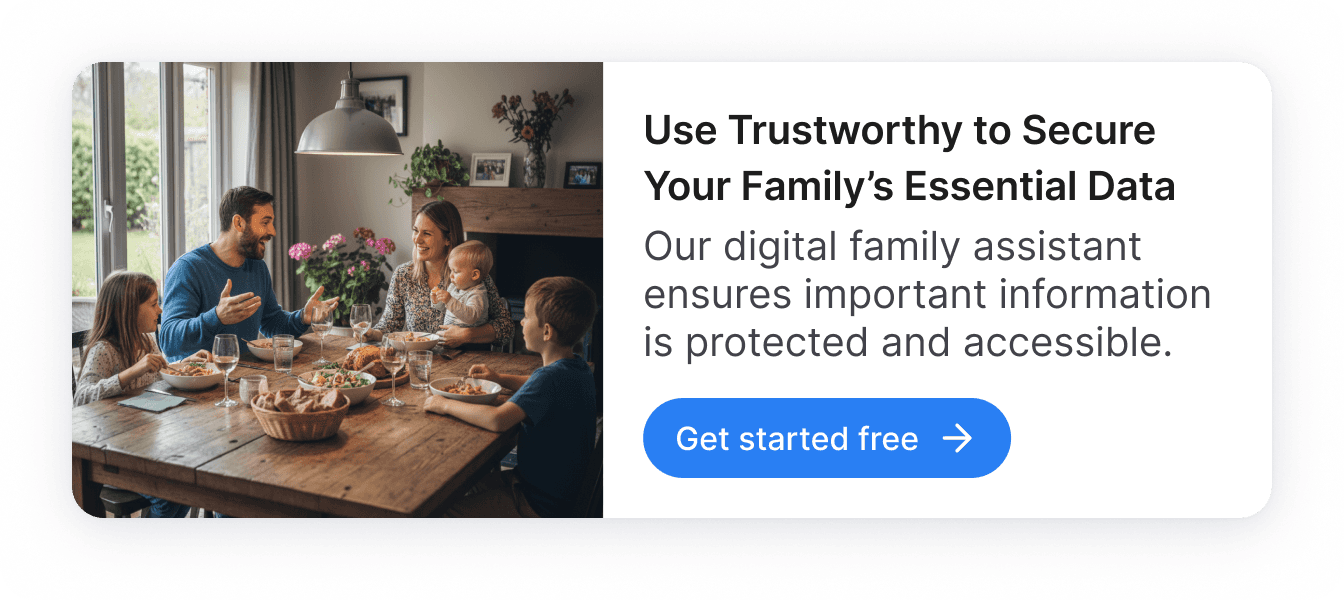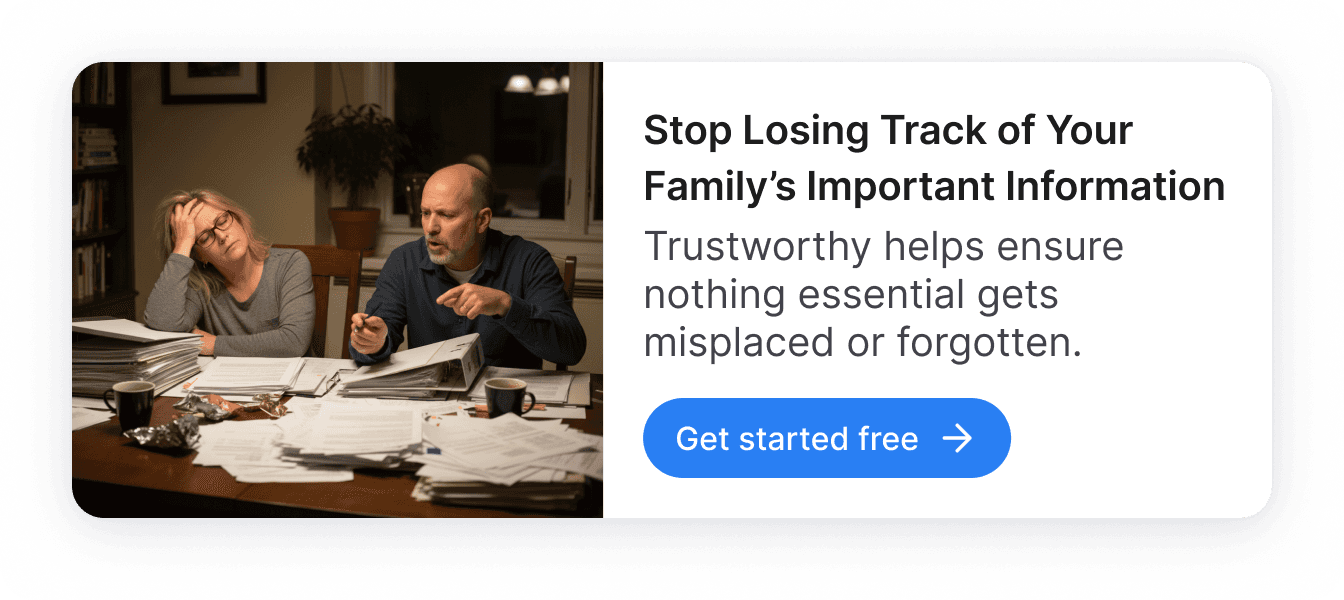
Key Takeaways
A safety deposit box provides secure physical storage but with strict access limitations.
Access is restricted to bank hours, which can delay retrieval during emergencies.
Rental fees apply continuously, regardless of how often the box is accessed.
Value depends on how frequently documents need to be accessed or updated.
Digital vaults offer a secure, flexible, and accessible alternative to safety deposit boxes.
In a world where so much of life happens online, the appeal of renting a safety deposit box at a bank is fading fast.
Once viewed as the gold standard for keeping valuables safe, these boxes are now limited, inconvenient, and often uninsured.
Meanwhile, digital vaults — like Trustworthy, the Family Operating System® — offer a secure, flexible, and accessible way to organize and protect what matters most.
Instead of locking your documents away in a physical box that you can access only during business hours, you can keep them encrypted, searchable, and shareable from anywhere.

How Traditional and Digital Storage Differ
Q: What is a safety deposit box, and how does it work?
A: A safety deposit box, also known as a safe deposit box, is a metal container stored inside a bank’s or credit union’s vault. You lease it, receive one key, and the bank holds a second “guard key.”
Both are required to open the box, and you can add co-lessors who share equal access. But you can visit only during the bank’s hours, and the bank doesn’t insure or even know what’s inside.
That means if the contents are lost, stolen, or destroyed, you’re on your own.
Related: Are Safety Deposit Boxes Fireproof?
Q: What is a digital safety deposit box, and why has it become more useful?
A: A digital safety deposit box, or digital vault, is a secure, encrypted system where you can upload and manage important records such as wills, IDs, insurance documents, and financial files.
With Trustworthy, your documents are organized, encrypted, and backed up automatically. You can control exactly who has access and for how long — giving family members, advisors, or attorneys secure, permission-based visibility when needed.
Unlike a traditional box, a digital vault offers anytime, anywhere access without sacrificing security. For most people, that balance of protection and availability is far more practical than storing paper documents in a locked metal drawer across town.
Access, Cost, and Control
Q: What are the downsides of using a traditional safety deposit box today?
A: The challenges of using a traditional safety deposit box aren’t new, but they stand out even more in a world where better alternatives exist:
Limited access: You can reach your box only during bank hours — an obstacle in emergencies.
No insurance: The FDIC insures your bank accounts, but not the contents of your box. You’d need separate insurance for valuables.
Risk of loss: Losing the key means paying to have the box drilled open, which could cost $100 to $200, or sometimes even more.
Branch closures: Many financial institutions are eliminating safety deposit boxes.
Outdated model: When you can store and securely share documents digitally, a box that requires two physical keys feels more cumbersome than protective.

Q: How much does a safety deposit box cost?
A: Costs vary by bank, box size, and location, but these are typical costs:
Small boxes (roughly 3 by 5 inches): $15 to $60 a year.
Medium boxes (about 5 by 5 inches or 3 by 10 inches): $40 to $150 a year.
Large boxes (10 x 10 inches, or deeper): $250 or more a year.
Those prices add up quickly, especially considering the lack of insurance and limited utility. By contrast, a digital vault like Trustworthy provides secure, encrypted storage with automatic organization and no restriction on when you can access your information.

What Belongs Where
Q: What items are better stored physically, and which belong in a digital vault?
A: Physical boxes are now best reserved for irreplaceable, tangible objects you rarely need to access — like jewelry, small heirlooms, or original artwork.
But when it comes to essential documents, digital storage wins. Trustworthy, for example, keeps your wills, titles, birth certificates, tax returns, and insurance files secure, private, and accessible.
With a digital vault, you can give your spouse, accountant, or attorney access to specific records while keeping the rest private. That flexibility simply doesn’t exist with a bank vault.

The Bottom Line
Safety deposit boxes once represented the pinnacle of security — but in today’s connected world, they’re more of an inconvenience than an advantage. Limited access, lack of insurance, and high costs make them a relic of the past.
Modern digital vaults like Trustworthy provide the same peace of mind with far more flexibility. With encrypted cloud storage, customizable sharing, and 24/7 availability, Trustworthy ensures that your family’s most important information stays secure and available whenever it’s needed — without the keys, the fees, or the hassle.
Try Trustworthy for free, for as long as you want.
We’d love to hear from you! Feel free to email us with any questions, comments, or suggestions for future article topics.











